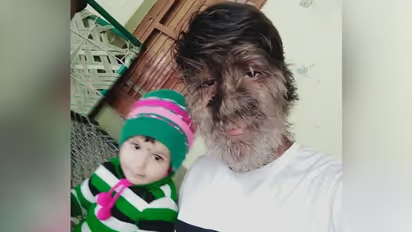MP boy diagnosed with rare 'werewolf syndrome'; Know about the disease with no cure

Synopsis
A 17-year-old boy in Madhya Pradesh lives with a rare condition that has caused him to grow dense fur all over his body. Known popularly as “werewolf syndrome”, the genetic anomaly called hypertrichosis is incurable.
A young man from Madhya Pradesh has dense fur all over his body as a result of the extremely unusual illness known as "Werewolf syndrome." Lalit Patidar, a 17-year-old resident of Nandleta village, has hypertrichosis, which is characterised by excessive hair growth on any part of the body, according to Healthline. Patidar, who has had the illness since birth, claims he didn't notice anything out of the ordinary until he was a teenager.
"When I was younger, I frequently received stone-throwing. Children were afraid that I would return and bite them like an animal," he told the New York Post. "My parents claim that I was shaved by the doctor at birth, but I didn't become aware of the difference until I was approximately 6 or 7 years old. The hair started to sprout all over my body at that point, unlike anyone else I knew," he added.
Also Read | Delhi: 25-yr-old kills entire family after returning from rehab a few days ago
None of the other family members, according to Patidar, have hypertrichosis. Since there is no treatment for hypertrichosis, Patidar claims he uses bleaching, cutting, shaving, waxing, lasers, and other hair removal techniques to try to keep the hair at bay.
What is this rare 'werewolf syndrome'?
"Werewolf syndrome," also known as hypertrichosis, is the excess production of hair, either in one specific area or all over the body. Though the reasons of this incredibly uncommon disorder have not yet been fully identified by medical research, it is known that it is a hereditary disease. Although there is no known treatment for the ailment, some kinds of hypertrichosis can be controlled with medicine, according to medical professionals. Additionally, you can use techniques like shaving, epilation, waxing, bleaching, or plucking to remove hair permanently or temporarily.
Also Read | Shraddha murder: Why Aaftab's 'confession' is not admissible in court
Stay updated with the Breaking News Today and Latest News from across India and around the world. Get real-time updates, in-depth analysis, and comprehensive coverage of India News, World News, Indian Defence News, Kerala News, and Karnataka News. From politics to current affairs, follow every major story as it unfolds. Get real-time updates from IMD on major cities weather forecasts, including Rain alerts, Cyclone warnings, and temperature trends. Download the Asianet News Official App from the Android Play Store and iPhone App Store for accurate and timely news updates anytime, anywhere.